|
|
|
Sort Order |
|
|
|
Items / Page
|
|
|
|
|
|
|
| Srl | Item |
| 1 |
ID:
179339
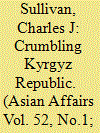

|
|
|
|
|
| Summary/Abstract |
Although Kyrgyzstan has recently withstood two coup d'états (or so-called “revolutions”) and a bout of ethnic violence, the politicization of the legal system by successive presidents portends a troublesome future. The 2017 transition from Almazbek Atambaev to Sooronbai Jeenbekov gave way to the former's arrest and imprisonment. A series of other prior arrests and incarcerations of (former) parliamentarians indicate that Kyrgyzstan's presidents are regularly manipulating the legal system to persecute and neutralize their rivals. This article posits that the repetitive rupturing of legal institutions will usher in an era of heightened illiberalism, elite uncertainty, and the further discrediting of the political system, thereby placing the state on the brink of failure. The mass uprising in response to the October 2020 parliamentary electoral results and most recent coup d'état indicate that the prospects of the Kyrgyz Republic suffering a collapse are real.
|
|
|
|
|
|
|
|
|
|
|
|
|
|
|
|
| 2 |
ID:
091232
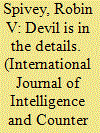

|
|
|
|
|
| Publication |
2009.
|
| Summary/Abstract |
The legal Devil's Advocate is clearly a role-player. yet his ability to assume characteristics identified with authentic dissenters makes that dissent more productive. The legal culture's acceptance of dissent increases the opportunities for actual dissenters to influence it, and facilitates the activities of its role-players. Lawyers also have a range of techniques available for use on their clients behalf.
|
|
|
|
|
|
|
|
|
|
|
|
|
|
|
|
| 3 |
ID:
133949
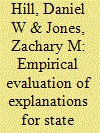

|
|
|
|
|
| Publication |
2014.
|
| Summary/Abstract |
The empirical literature that examines cross-national patterns of state repression seeks to discover a set of political, economic, and social conditions that are consistently associated with government violations of human rights. Null hypothesis significance testing is the most common way of examining the relationship between repression and concepts of interest, but we argue that it is inadequate for this goal, and has produced potentially misleading results. To remedy this deficiency in the literature we use cross-validation and random forests to determine the predictive power of measures of concepts the literature identifies as important causes of repression. We find that few of these measures are able to substantially improve the predictive power of statistical models of repression. Further, the most studied concept in the literature, democratic political institutions, predicts certain kinds of repression much more accurately than others. We argue that this is due to conceptual and operational overlap between democracy and certain kinds of state repression. Finally, we argue that the impressive performance of certain features of domestic legal systems, as well as some economic and demographic factors, justifies a stronger focus on these concepts in future studies of repression.
|
|
|
|
|
|
|
|
|
|
|
|
|
|
|
|
| 4 |
ID:
183723
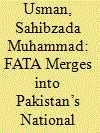

|
|
|
|
|
| Summary/Abstract |
This article examines the Federally Administered Tribal Areas (FATA) in the Pakistani national system. In the current global war on terrorism, Pakistan’s FATA became a stronghold from jihadist to terrorist. After 9/11, under international pressure, the Pakistani government worked hard to implement its law in FATA. During this process, Pakistani forces push the Taliban out of tribal areas through military operations. To guarantee peace, prosperity and stability in the area, Pakistan combines mainstream tribal areas into the country by implementing a comprehensive legal framework for illegal areas. This article examines Pakistan’s integration options that allow FATA to enter its federal system and inspects the integrating tribal areas with Khyber Pakhtunkhwa (KPK) Province, which has great similarities with its race, religion and culture and is part of the federal system for 70 years. This article also focuses on the economic and administrative reforms necessary to establish real national control and FATA’s consolidation on an equal footing with other provinces of Pakistan.
|
|
|
|
|
|
|
|
|
|
|
|
|
|
|
|
| 5 |
ID:
132761


|
|
|
|
|
| Publication |
2014.
|
| Summary/Abstract |
Over the past half-century, the number of cases entering American federal and state courts has multiplied. But, largely unobserved by the public, the percentage of those cases that are disposed of by trial has steadily decreased. In recent decades, as the increase in filings has leveled off but the percentage of cases reaching trial has continued to fall, the absolute number of trials has decreased as well. Conducting trials is a shrinking portion of what judges do. The effects of this turn away from trials on judges, on litigants, and on public perceptions of the legal system remain to be explored.
|
|
|
|
|
|
|
|
|
|
|
|
|
|
|
|
| 6 |
ID:
163668
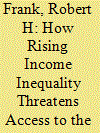

|
|
|
|
|
| Summary/Abstract |
Incentives that lead sellers to introduce quality improvements and cost-saving innovations in competitive markets also ensure that no opportunity to cheat consumers remains unexploited. That difficulty underlies many American laws. But many people lack the income necessary to pay for legal interventions against unjust treatment, preventing them from meeting basic needs, like protection against financial fraud and abusive relationships. Growing income inequality has made this justice gap worse by reducing public funds available for legal aid in real terms, while also making it more difficult for low-income people to make ends meet. Simple policy changes could ease both problems without sacrifices from anyone. Those who could afford tax increases necessary to pay for more social services, including competent legal representation for everyone, resist this step because they believe that it would make it harder to buy the special things they want. But that belief is incorrect because the supply of special things is limited. The ability to bid successfully for them is unaffected by higher taxes, which do not affect relative purchasing power.
|
|
|
|
|
|
|
|
|
|
|
|
|
|
|
|
| 7 |
ID:
163634
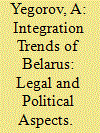

|
|
|
| 8 |
ID:
133701


|
|
|
|
|
| Publication |
2014.
|
| Summary/Abstract |
Common notions about the source of communal land conflict in Africa have long explained it as growing out of conditions of environmental scarcity. This article argues instead that the institutional structure of the legal system is central to understanding which countries are prone to experience communal land conflict. When competing customary and modern jurisdictions coexist in countries inhabited by mixed identity groups, the conflicting sources of legal authority lead to insecurity about which source of law will prevail. Because the source of law is contested, conflict parties cannot trust the legal system to predictably adjudicate disputes, which encourages the use of extrajudicial vigilante measures. Using new data on communal violence in West Africa, this argument is examined for the period 1990-2009. The results show that in countries where competing jurisdictions exist, communal land conflict is 200-350% more likely. These findings suggest that researchers should consider the role of legal institutions and processes in relation to social unrest and collective violence
|
|
|
|
|
|
|
|
|
|
|
|
|
|
|
|
| 9 |
ID:
091237
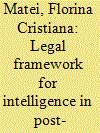

|
|
|
|
|
| Publication |
2009.
|
| Summary/Abstract |
A legal framework for intelligence delineates the rights, obligations, and powers of the intelligence organisations, as well as the arrangements for their governance and accountability, provides the intelligence system with guidance as to what it can and cannto do, indicates who is in charge and who oversees the activity of intelligence; insures that the intelligence apparatus is responsible before the law in case of abuses; makes sure that the IC benefits from legal protection if it observes the legally agreed guidance and directions.
|
|
|
|
|
|
|
|
|
|
|
|
|
|
|
|
| 10 |
ID:
127972
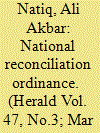

|
|
|
| 11 |
ID:
157163
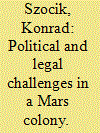

|
|
|
|
|
| Summary/Abstract |
In our essay we are going to briefly discuss some legal and political questions associated with the future colonization of Mars which is now being planned by NASA and the second one is known as Project MarsOne. We assume that it will be unclear as to which legal and political solutions could work in the new Martian ecological niche. Here we will show that this issue requires more attention because we unable to predict which elements of human nature will dominate the lives of the Mars colonizers.
|
|
|
|
|
|
|
|
|
|
|
|
|
|
|
|
| 12 |
ID:
133944
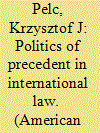

|
|
|
|
|
| Publication |
2014.
|
| Summary/Abstract |
The concept of precedent is fundamental to domestic courts, especially in Anglo-American common law systems, where judges are bound to the court's past decisions. By contrast, precedent has no formal authority in international law. Legal scholars point to Article 59 of the International Court of Justice (ICJ) Statute in this respect, according to which international legal rulings are binding only on the parties in the dispute at hand, and have no bearing on matters outside of the case.
|
|
|
|
|
|
|
|
|
|
|
|
|
|
|
|
| 13 |
ID:
163678
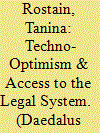

|
|
|
|
|
| Summary/Abstract |
For legal technologists, apps raise the prospect of putting the law in the hands of disadvantaged people who feel powerless to deal with their legal problems. These aspirations are heartening, but they rest on unrealistic assumptions about how people living in poverty deal with legal problems. People who are poor very rarely resort to the law to solve their problems. In the situations when they do seek solutions, they confront educational and material impediments to finding, understanding, and using online legal tools effectively. Literacy is a significant barrier. More than 15 percent of all adults living in the United States are functionally illiterate, meaning that, at best, they read at the fourth-grade level. Inadequate access to the Internet and limited research skills compound the challenges. To reach people from marginalized groups, access-to-justice technologies need to be integrated with human assistance.
|
|
|
|
|
|
|
|
|
|
|
|
|
|
|
|
| 14 |
ID:
124600
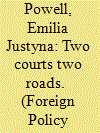

|
|
|
|
|
| Publication |
2013.
|
| Summary/Abstract |
The International Court of Justice (ICJ) and the International Criminal Court (ICC) constitute two prominent international courts. However, there exists considerable variation in states' support for these two institutions. The Rome Statute, which recognizes the jurisdiction of the ICC has been ratified by over half the states in the world; only a third of states accept the compulsory jurisdiction of the ICJ. How are we to understand this variation in state support for these two courts? I argue that there is an inherent link between the quality of a state's domestic legal system (rule of law) and perceived legitimacy of an international court. Empirical analyses of states' support for the ICJ and the ICC show that rule-of-law states lend support to the ICC, a court perceived by the international community as legitimate. Alleged bias of the ICJ has, on the other hand, substantially weakened support for this court among rule-of-law states.
|
|
|
|
|
|
|
|
|
|
|
|
|
|
|
|
| 15 |
ID:
129557
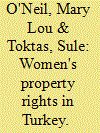

|
|
|
|
|
| Publication |
2014.
|
| Summary/Abstract |
This article takes Turkey as a case study, exploring marital and inheritance regimes with regard to their impact on women and their ability to protect women's property rights. The aim of the study is to bring to light the workings of the legal system that regulate the acquisition of property and to scrutinize the gap between the law and its practice in Turkish society. By taking this approach, the article does not only focus on laws but also on how these laws are adopted by society. Thus, two levels of analysis-de jure and de facto-are utilized for an investigation of women's property rights and hence their social and economic status.
|
|
|
|
|
|
|
|
|
|
|
|
|
|
|
|
|
|
|
|
|